- Home
- Carol Bruneau
A bird on every tree
A bird on every tree Read online
Praise for A Bird on Every Tree
Bruneau’s writing rarely calls attention to itself, but this is a bravura performance…. [A] close examination reveals every sentence to be carefully crafted, with an attention not only to sense and sound but character and place. As a result, every story feels unique and spontaneous, genuinely surprising…. This is no mere exercise in voice: this is a reflection of a writer utterly in touch with her stories—not only what they are, but how they are, overlooking nothing in her craft. Bruneau is a master. We should know this by now, but A Bird on Every Tree is a powerful reminder.”
–starred review, Quill & Quire
“Each of Carol Bruneau’s stories is not so much told as meticulously shaped with exacting and mesmerizing attention to every gorgeous detail. Bruneau submerges the reader entirely in the physical and emotional worlds she so vividly evokes.”
–Lynn Coady, Giller Prize–winning author of Hellgoing
“This collection of short stories by one of Atlantic Canada’s beloved storytellers is ambitious, eloquent, honest. A writer who crawls inside her characters and brings their hearts to the page.”
–Donna Morrissey, award-winning author of The Fortunate Brother
“Carol Bruneau is the Mavis Gallant of the North Atlantic. Her diverse stories illuminate entire lives, each story as rich and deeply layered as a novel. Her narrative voice is an extraordinary blend of elegance and grit, the characters and their observations both pragmatic and elegiac. These are stories of a diverse range of people…all told with startling detail, lyrical prose, and uncanny insight into those moments which break us apart and those which hold us together.”
–Christy Ann Conlin, author of The Memento
“A wide range of twelve beautiful and genuine stories, all connected through the considerable pull of Nova Scotia…. The tying knot pulsing through these stories seems to be that you can leave, but you will still be tethered to Nova Scotia. Perhaps by some long invisible salt chain, a guiding light reminding you of where you come from.”
–Atlantic Books Today
“In these dozen bittersweet tales, Carol Bruneau writes persuasively and engagingly about love, longing, and loss…. a fine collection that is grounded in the real world and profoundly human.”
–Ian Colford, author of Perfect World
“The stories in A Bird on Every Tree are decidedly larger than the few pages they inhabit…. Ms. Bruneau writes with a graceful precision and has a deftness with words and their cadences, their implications and meanings.”
–The Miramichi Reader
Praise for Carol Bruneau
These Good Hands
“A gripping novel with poetic insights into human behaviour and a rich sense of place.”
–Chronicle-Herald
“A definite recommended read. I really came to connect, sympathize, and understand these characters. Camille in particular felt extraordinarily real. I connected with her passion and her desire to get more out of life. Bruneau has woven a powerful story that takes place alongside WWII, with characters who spring to life off of the page.”
– Worn Pages and Ink
“Compassionate and richly textured, These Good Hands is one of those rare stories of female friendship that makes us grow in unsuspecting ways.”
– Eva Stachniak, bestselling author of The Winter Palace and Empress of the Night
“[An] indelible novel of age, mental disorder and beauty.”
– The Sun Times
Glass Voices
“This novel is so rich in detail and emotion that a first reading merely opens the reader to an appreciation of its gifts. Its density submerges the reader in a complete world of character, plot and setting…. Glass Voices illustrates the immense strength some people have to cope with tragedy—and that is truly inspiring.”
–The Globe and Mail
“Glass Voices demonstrates how profoundly love shapes lives, no matter what else happens…textured and rich.”
–Quill & Quire
“A remarkably intricate, textured and complex novel…deeply compassionate.”
–Literary Review of Canada
Purple for Sky
“Carol Bruneau’s Purple for Sky…will be this year’s unheralded surprise. Bruneau has a saucy, punchy even ebullient writing style, and is completely at ease in the wonderful Arcadian milieu of the story.”
–The National Post
“An endearing, entertaining tale by a first-class storyteller…. It is as meticulously crafted and multi-textured as the quilt that stands as the book’s central metaphor.”
–The Globe and Mail
“Reminiscent of Margaret Laurence’s The Stone Angel…. An intricate and compelling novel [that] holds a rich inventory of complex characters, historical details, and hard-won truths.”
–Atlantic Books Today
Depth Rapture
“With her compassionate eye, her understanding of the human condition, her strong sense of place, her clean, lyrical prose, Carol Bruneau is an easy writer to praise. With her second collection of stories, she has shown herself to be one of the brightest lights in Atlantic fiction.”
–Pottersfield Portfolio
“[I]t’s the bold sense of bold-face confidence that makes these stories lethally strong and lethally true…an amazing progression for an astonishingly talented writer.”
–The Sunday Herald
“The maturity and richness of a first-class storyteller.”
–The Globe and Mail
Copyright © 2017, Carol Bruneau
All rights reserved. No part of this book may be reproduced, stored in a retrieval system or transmitted in any form or by any means without the prior written permission from the publisher, or, in the case of photocopying or other reprographic copying, permission from Access Copyright, 1 Yonge Street, Suite 1900, Toronto, Ontario M5E 1E5.
Vagrant Press is an imprint of
Nimbus Publishing Limited
3731 Mackintosh St, Halifax, NS, B3K 5A5
(902) 455-4286 nimbus.ca
Printed and bound in Canada
NB1273
Cover image: Frozen by Lynn Misener, 2014, mixed media and oil
These stories are works of fiction. Names, characters, incidents, and places, including organizations and institutions, either are the product of the author’s imagination or are used fictitiously.
The following stories were previously published: “The Race” in Riddle Fence #20 (2015); “The Vagabond Lover” by Pottersfield Press in Nova Scotia Love Stories (2015); “Doves” by Goose Lane Editions in Running the Whale’s Back (2013) and in The Antigonish Review (Spring 2005); “Polio Beach” by Breton Books in Local Hero: New Cape Breton Stories (2015).
Library and Archives Canada Cataloguing in Publication
Bruneau, Carol, 1956-
[Short stories. Selections]
A bird on every tree : stories / Carol Bruneau.
ISBN 978-1-77108-502-1 (softcover)
I. Title.
PS8553 R854A6 2017 C813’.54 C2017-904095-2
Nimbus Publishing acknowledges the financial support for its publishing activities from the Government of Canada through the Canada Book Fund (CBF) and the Canada Council for the Arts, and from the Province of Nova Scotia. We are pleased to work in partnership with the Province of Nova Scotia to develop and promote our creative industries for the benefit of all Nova Scotians.
For the Spoonmaidens + one = Cindy, Shawn, & DR
All nature seemed inclined to rest
But still there was no rest for m
e.
—“Farewell to Nova Scotia”
The time of the singing of birds is come,
and the voice of the turtle is heard in our land.
—Song of Solomon 2:10
Fish got to swim, birds got to fly.
—Oscar Hammerstein II, Showboat
the Race
The only thing I was ever really scared of was drowning. Being knocked out of the running—imagine—like being held back, held under by some strange hand; and after all my practising, till I was near blue! Dare anyone fault a girl for trying: so I told myself, knifing through the chop, the Arm like a crumpled envelope. Nobody deserved to win more than me, obvious even before the gun cracked, the sound ringing over the cove.
A finer day would’ve helped, a fierce wind for July pushing against us—all forty of us, gents and gals. One thing you could say for it: wind didn’t pick favourites, bloody offshore breeze whipping everything up, rocking the gawkers in their dinghies—hundreds lining the route—what you could see of them anyways, coming up for each breath. Boater hats, cheering mouths. Mucky-mucks, mostly, a few I vaguely recognized but none that mattered. Fellas snapping photos, for the paper, likely. The world-famous mixed long-distance race, they were touting it, nearly half of us swimmers ladies, a few from as far away as Boston, here to show us slacker bluenosers what-for, I suppose. Three miles from the government wharf to the club with its swanky pool and boathouse, afternoon teas, tennis, and what-have-yous: the finish.
What, that little thing? All she has to do is look good. Sure I heard the comments, diving in. The water cold enough to turn your lungs to slob ice. Thrashing arms and legs all around and ahead of me, I let the snarky remarks sink away.
Arse in gear, Mar, eye on the prize. Delirium, maybe, but I could already see the picture framed: the silver trophy being hoisted into whose arms? Little Marion née McGinty’s, that’s whose. Notebook-juggling newsmen scribing away. Cameras flashing. In every shunt of seawater scalding my eyes, sure I could see it, the way I could hear them back in the old country—those who hadn’t batted an eye seeing me go. Well, they’d have a different opinion when all around the globe the news flashed. Not that Marion McGinty? Not ours? Twenty-five-year-old beauty takes first prize in world’s longest-ever mixed saltwater race. Gad, is it ten years since she left us? That long?
Winning wasn’t a pipe dream. Not when you wanted something this fierce. Though the first quarter-mile not behind me, I could feel the numbing while I pushed back that crazy fear, keeping afloat of it.
The last person that one can afford to let down is herself.
So the water became turf, my hands trowels but for the pins and needles. Legs, scissors; arms and shoulders, fly wheels, till pretty much my whole body was no longer a letter-knife but a sewing machine stitching a straight seam through whitecaps. Snip-snip, stitch-stitch. A weave of muscle crawling through spray, I heaved and hewed my way. Always knew what she wanted, Marion did, whether it suited anyone else or not. Well, the one thing I wasn’t was a quitter. No quitter ever profits, slosh-glugged in both ears. The Arm pure crystal cleaving all around—a thousand chandeliers smashing, it could’ve been—and a spotter in a dinghy yelling through a bullhorn: The half-mile mark!
Chandeliers like my husband Willard had promised would light every room—what a load, that. As good as the rocks so many fathoms below. Who had to see to know they lurked? Dumb as clouds under the crashing surface, they’d have thrown me off had I been fool enough to glance down.
The one time I had looked down, crossing this very stretch of water, gad, the sight near docked me from where I’d been headed. The one time I’d been colder than now—all but my feet, that is—when I could’ve, should’ve taken those rocks as a sign, a sign of what lay ahead. But who isn’t an ignoramus at fifteen, and if in this world you expect a snowball’s chance in hell of succeeding, best not to bellyache. So I told the thunder in my head, its frozen, stinging burble in my nose and ears and the back of my throat. Because the worst could’ve happened that time but didn’t. Jesus, Mary, Joseph, and all the saints must’ve been with me. Because I’d made it then, hadn’t I?
Mind on the race, Mar. Mind on the race.
One mile!
One and a quarter miles!
Yet the aching cold brought it back: the wintry day I landed in this godforsaken place, by sea naturally; the rocks under ice. Who knew then salt water froze into a road? No one to meet me at the docks, sweep me off my feet, slather me with kisses—not even Willard’s poker-faced relations. But a man who stamped my papers gave directions, another carted my bag partway, for free—no skin off my neck, a little flirting into the bargain, flashing my wedding band. My hair a snarl from the week-long crossing. Some took me for being a touch older than I was, on account of it perhaps?
One and a half miles!
Fastest way to get there is on foot, darlin’. Over the Arm, I was told, a branch of the harbour so great it didn’t freeze. My husband of two weeks a thousand million miles away—on a boat to France or in a foxhole? We’d met in London. I’d just arrived from Belfast. Marry me, he’d said, his offer not unappealing. A different life, a better life, one that involved automobiles and not walking wherever you went. Dining off fine china in a house with so many rooms you could get lost. His family’s digs a thousand times grander than anything you’d find here, he said. An estate overlooking the sea, with a view of ships coming and going, and the best neighbours around, treating you as their own. Leave the fighting to Europe—Yurp, he called it—and the peace and quiet to them back home. What wasn’t to like over there on the better side of the ocean?
One and three-quarter miles! Then two! Two, and one left to go! Three in the lead, well past the midway mark! a voice blasted from the bullhorn, all but drummed out by the tumbling water. The rip and ride of muscle, shoulder blades, hips, knees, ankles—it was like I could no longer feel any of these parts, only hear their workings, and my salt-blinded eyes fixed on nothing, all of me unmoored as a buoy bobbing off, to be caught between the rocks and gliding keels?
Marion, Marion: you’re losing ground, girl! Eye on the prize, eye on the prize: focus! But all my buoy-eyes took in were jets, eruptions, spurts, and flashes—a glimpse of animals sounding ahead, far ahead. Swimmers like seals. The burn in my back either a gaff hook or an anchor.
That long-lost winter evening the rocks might well have been clouds in a night sky. Watch me walk on water! I fended off the old voices nattering about ‘thin places.’ The howling cold, the suppertime dusk streaked with red, nothing in my belly since the ship’s sad lunch. ‘Sweetpea,’ the baggage handler had called me, directing me around the tip of a wooded point to a wharf embedded in ice, a path shovelled in the snow. Smarter, I’d have pocketed Willard’s ring, to be pawned later on, all my earthly goods in that sole bag. Lucky thing you were born pretty, Mar. Looks are about all you’ve got. And lucky thing snow marked both sides of that straight black strip over the ice. The wind fit to blow me past the edge, where a seal lolled—a great slug of a beast but not as threatening as whatever creatures lurked on land, nothing but thick dark forest stretching up from either shore. Sprinklings of light here and there, from the tiniest of hovels huddled below a bluff. The wind enough to wring tears. The soles of my boots skidding along, my bag a deadweight and certain to shame me when I reached Willard’s parents’.
You’ll have the finest glad rags cash can buy, Marion McGinty: another of his promises. Granted, I knew my husband little more than in the biblical way when we parted. His arms made a cosy belt around my waist, his height a mantle draped over me. Tall, he was, but no giant, and in no way remarkable other than for the gift of gab and one other talent, drawing. Cartoons sketched on wallpaper lifted from where we roomed, between our meeting and my departure. He promised me the northern stars while drawing the Kaiser and a pack of bayonet-wielding troops. Marching, they were, always marching—something invisible putting
the boots to them. The way it put the boots to me crossing the ice, and now, immersed in the drink, the sea.
It was pitch dark that day when I reached shore, or the shore reached me. Lookin’ for the Lesters? they said, the first place I tried. Up thataway, see? Past the school and the dip in the road, can’t miss it if you don’t blink. Picturing Willard, I wondered what he was eating, where he was sleeping. Something better than nothing and someplace warmer than here, I’d felt sinkingly sure.
The burning stopped. The cold stopped. The churning fountain ahead of me veered off. At the edge of my bobbing sight pink skin flashed, well, bluish-pink, purple. A girl was being hauled into a boat by an octopus—a mess of arms. That’s all there was time to see. Warm arms, warming flesh. The salt tasted like blood, or was blood become salt? I was no longer warm- but cold-blooded; no longer had lungs, but gills. I’d drowned, sure, just didn’t know it yet.
If you quit, you’ll have a snowball’s chance of thawing, being warm again.
It might’ve been sea smoke, not spray, clouding my sight. The ocean boiling on a frigid February night, offering its vapour to the heavens. But sense pulled me back. You can still win this, Mar. Another boat rode alongside, close, too close—get out of my way! More octopus arms, a fountain’s jets silenced: another opponent plucked out of the running. Plucked upwards, lifted—a mockery, a trick to make quitting look easy, sensible? My brain cramped around the thought.
Voices were shouting. Less than three-quarters of a mile to go! We were neck and neck—first the shiny blue of a bathing cap, then the seal-black of another head. This one lagged, lagged, floated, taunting me, mocking me, sure: a bluish log adrift, rolling onto its back, then being retrieved from the chop. Sure, I’d drowned. Sure, my gills had stopped working. In a spasm I’d downed an ocean’s worth of water? Eye on the prize. Don’t let yourself be sidetracked, hoodwinked, do not. But the old voices were a chilly clamour: Marion McGinty, who do you think you are?

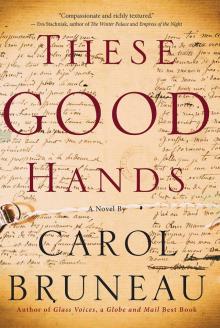 These Good Hands
These Good Hands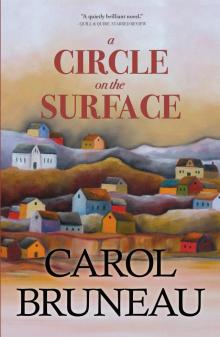 A Circle on the Surface
A Circle on the Surface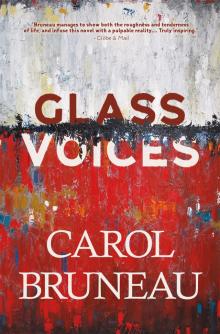 Glass Voices
Glass Voices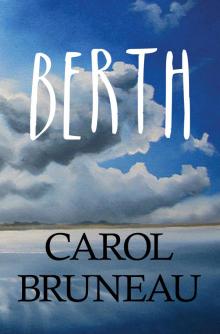 Berth
Berth Brighten the Corner Where You Are
Brighten the Corner Where You Are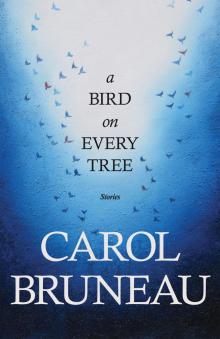 A bird on every tree
A bird on every tree